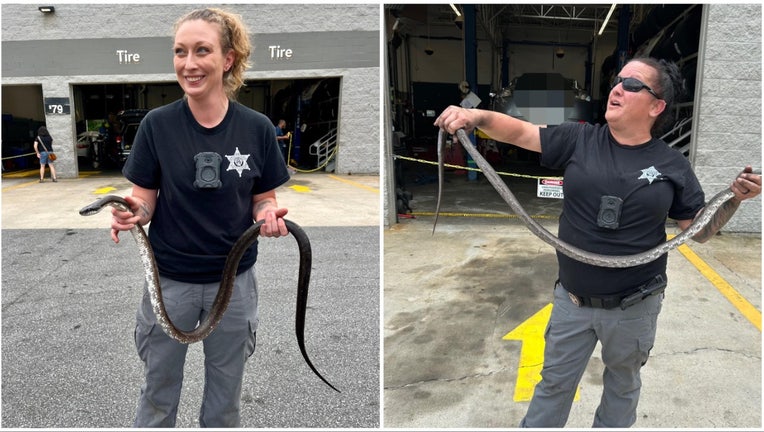Slithering stowaway delays shopper at Bibb County Walmart

Courtesy of Bibb County Sheriff's Office
BIBB COUNTY, Ga. - Talk about a surprise ride-along.
Bibb County Sheriff’s Animal Enforcement Officers Rebecca Galeazzo and Leann Strickland were called to the Walmart on Gray Highway after an unexpected — and very flexible — hitchhiker was discovered under a shopper’s vehicle.
What we know:
The culprit? A sneaky Eastern rat snake, who apparently decided the car's undercarriage was the perfect place for a siesta. The snake had wrapped itself snugly around several critical car parts, giving new meaning to the phrase "road hazard."
Officers had to call in some backup — in the form of a car lift — to safely access and remove the stubborn serpent. Despite the impromptu mechanical challenge, the officers gently freed the reptilian troublemaker, who was none the worse for wear.
What's next:
The snake was safely released back into the wild in a nearby wooded area, where it can once again enjoy life without brake lines and suspension systems.
No word yet on whether the snake gave Walmart's rollback prices a five-star review.
Dig deeper:
Just like most people, snakes like to get out and about once spring arrives. Fortunately, only 7 of the 47 snake species native to Georgia are venomous — and only one, the copperhead, typically lives in suburban areas, according to the Georgia Department of Natural Resources.
The other venomous species found in Georgia are:
- Cottonmouth (water moccasin)
- Eastern diamondback rattlesnake
- Timber/canebrake rattlesnake
- Pigmy rattlesnake
- Eastern coral snake
Nonvenomous snakes such as the scarlet kingsnake, eastern hognose, and various watersnake species are often mistaken for their venomous counterparts — coral snakes, rattlesnakes, and cottonmouths, respectively.
Although pit vipers — a group that includes all venomous snakes native to Georgia except the coral snake — are often recognized by their broad, triangular-shaped heads, many nonvenomous snakes flatten their heads when threatened, making them appear triangular as well. Some nonvenomous species also have color patterns that mimic venomous snakes.

How to recognize Georgia's venomous snakes
Snakes are abundant in Georgia, but only a handful of species in the state are venomous. Georgia DNR Conservation's Senior Wildlife Biologist Daniel Sollenberger joins Alyse Eady to give her the 4-1-1 on Georgia's snakes.
Importantly, just because you don’t like snakes isn’t a reason to kill them.
Nonvenomous snakes are protected by state law in Georgia. One species, the eastern indigo snake, is even federally protected. Killing a protected snake could result in a fine of up to $1,000 and up to a year in jail.
It’s also illegal to capture and keep a wild, nonvenomous snake as a pet. If you want a pet snake, officials recommend visiting a reputable pet store or breeder.
Additionally, some snakes eat rodents and brown and red-belied snakes also eat snails and slugs, which most gardeners dislike. Crowned snake species primarily eat centipedes.
What you can do:
If you find a snake in your car, here’s what you should do:
Stay Calm and Pull Over Safely
- Don't panic or make sudden movements.
- Slowly pull over to a safe location, away from traffic.
Turn Off the Engine and Exit the Car Carefully
- Open the doors carefully to give the snake an easy exit route.
- If you see the snake, avoid touching or disturbing it.
Keep Your Distance
- Stay a safe distance from the car to avoid a potential bite.
- If the snake is venomous (or you're not sure), assume it could be dangerous.
Call for Help
- Contact animal control, a local wildlife removal service, or non-emergency police for assistance.
- Some pest control companies also handle snake removals.
Do Not Try to Remove It Yourself
- Handling a snake can be dangerous, especially if you’re unsure of the species.
- Even non-venomous snakes can bite if they feel threatened.
If you find a snake in your yard
Leave It Alone (If Safe)
- Most snakes are harmless and will leave on their own if not threatened.
- Watch from a distance; do not try to touch or corner the snake.
Encourage It to Move
- Spray water gently with a garden hose to encourage the snake to move along.
- You can also lightly "herd" it toward an exit using a long broom — without getting too close.
Remove Shelter and Food Sources
- Clean up woodpiles, tall grass, leaf litter, and debris where snakes like to hide.
- Keep bird seed contained and rodent populations down (snakes often follow food).
Call a Professional
- If the snake is venomous, large, or refuses to leave, call animal control, a licensed wildlife removal expert, or a pest control company that handles snakes.
Seal Your Yard
- Repair holes in fencing and gaps under sheds and porches to prevent snakes from moving in permanently.

